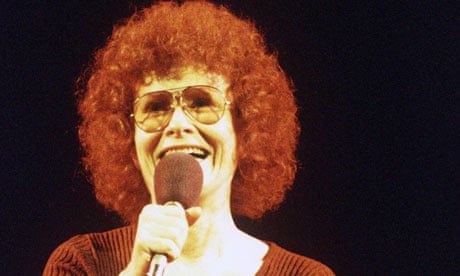The singer-songwriter Dory Previn, who has died aged 86, gained a significant following in the 1970s with her dark and honest view of life that drew on a troubled childhood, marriage difficulties and periods of mental illness. By then she had gained three Oscar nominations for lyrics – early signs of recognition in a career that soon took her on quite a different path.
Her start in Hollywood came in 1955, out of the MGM producer Arthur Freed's interest in her work. Initially she provided lyrics for André Previn, then much-occupied with movie scores. At first they collaborated at a distance, but once they had met, they made a jazz album together, The Leprechauns Are Upon Me (1958). In 1959 they married, Dory's earlier marriage having ended in divorce.
Their two Oscar-nominated songs were The Faraway Part of Town (1960), from the movie Pepe, for Judy Garland, and Second Chance (1962), from Two for the Seesaw. Dory worked with other composers, notably Harold Arlen and Fred Karlin, and it was with him that she gained her third nomination, for Come Saturday Morning (1969), from The Sterile Cuckoo, also known as Pookie. Her last collaboration with André came with Valley of the Dolls (1967), providing a hit for Dionne Warwick.
She always made it clear that throughout the rollercoaster course of her mental fragility in the 1960s, which was punctuated by spells in hospital, André was forever supportive, merrily playing piano for everybody in the sanatorium to which her escalating troubles brought her: "I don't know how he stayed so long," she recalled. "He left me for another woman after I had left him for another reality."
André went to live with the young actor Mia Farrow, who had been a visitor to the Previns' house. Though Dory found some stability in lyric-writing, she now lacked a regular composer, so she taught herself composition, working out her songs on the guitar. In 1970 she re-emerged, with big glasses and even bigger hair, with her first solo album, On My Way to Where, referring to a breakdown she had had while waiting for an aeroplane to take off.
In its most famous track, Beware of Young Girls, which Farrow at first thought tasteless but later appreciated, Dory wrote of a visitor who came bearing daisies: "She was my friend/ I thought her motives were sincere... / Ah but this lass / It came to pass / Had / A dark and different plan / She admired / My own sweet man." She noted that this visitor "admired my unmade bed", and even predicted that, having made off with the sweet man, "she will leave him one thoughtless day". The album's let-it-all-hang-out, confessional quality is encapsulated in Twenty-Mile Zone, about being detained by a policeman who accused her of "doing it alone / You were doing it alone / You were screaming in your car / In a twenty-mile zone".
More LPs swiftly followed: Mythical Kings and Iguanas, Reflections in a Mud Puddle (both 1971) and Mary C Brown and the Hollywood Sign (1972), originally an unproduced stage-show. There were also shy stage appearances – she knew that her talent lay more in the words than the music – one of which was captured as Live at Carnegie Hall (1973). A new label brought Dory Previn (1974) and We're Children of Coincidence and Harpo Marx (1976).
Born in Woodbridge, New Jersey, Previn came from an Irish-Catholic family. She and her alcoholic mother – "I came screaming from her womb. She never let me forget it" – were locked in the dining-room for several months by a father who had suffered from psychological difficulties after he was gassed in the first world war – a man who would throw her schoolbooks into the furnace.
She left school at 16. Despite "my pug-Irish features and my stumpy legs", she studied acting in New York, but, hard-up, left after a year, and found work as a model, dancer, actor, folksinger, secretary and babysitter. At 17, she fell in love and ended up in California, pregnant. After an abortion, she earned the bus fare east as a hat-check girl. Her first marriage again led to pregnancy, abandonment and an abortion.
An elderly actor's advice changed her luck: she must read books. "The next day I went to the public library and began at A." At a play-reading group, she was encouraged to write after reading out one of her poems. In Chicago, she met a Broadway producer who asked to see her in New York, where she came to the attention of Freed.
After the albums of the 1970s, she made few stage appearances, but her writing continued with two autobiographies, Midnight Baby (1976) and Bog-trotter: An Autobiography with Lyrics (1980).
In 1986 she married the actor and painter Joby Baker, who survives her. Her renewed friendship with André bore fruit in The Magic Number (1997), premiered by the soprano Sylvia McNair and the New York Philharmonic. In 2002, she released her Planet Blue songs free to the internet.
